
SARASOTA, Florida
FLORIDA'S CITY OF THE FINE ARTS
SARASOTA CHAMBER OF COMMERCE; ; and HISTORICAL SOCIETY OF SARASOTA COUNTY
SARASOTA, County Seat of Sarasota County, is most noted as the
artistic and literary center of the Florida West Coast due to its large number
of theaters, the famous Ringling
Art Museum, and a large
artist and literary community. A stroll or drive
around downtown reveals a large number of theatres, bookstores, and art galleries.
Yet the area was an agricultural wilderness
in the 1840's when homesteaders like William H. Whitaker from Savannah settled on Whitaker Bayou. After the
Civil War developers and land speculators posed such a danger to early settlers
who farmed under the 1862 Homestead Act that local farmers and ranchers formed
a Vigilance Committee against those who'd circumvent them
using earlier Federal laws. The conflict climaxed in the assassination of
Postmaster Charles Abbe in 1884 (plot started in Alfred Bidwell House (1884), once located at849 Florida Avenue.
In 1888 a new Era started when Sir John
Gillespie of Edinburgh, Scotland, arrived to start the Florida Mortgage
and Investment Company to promote land sales in the North and Europe.
Gillespie built Florida's
first golf course where downtown is located. The Florida Land Boom brought the Ringling family to develop resorts and other buildings. After WWII, Sarasota attracted a huge number of Northerners interested in the creative arts and there are few cities in the nation of this size with a more extensive fine arts community and facilities.
WHERE TO START: Most people visit
the state-operated RINGLING ART MUSEUM
and John Ringling’s waterfront mansion
three miles north of downtown off US41, so we will assume you are traveling
south on US41 toward downtown. As you
near 8th Street,
you will see Sarasota’s
arty Northern waterfront.
AtFifth
Street at 801 North Tamiami Trail (US41) is the old
MUNICIPAL AUDITORIUM (1938), a
$131,000 W.P.A. Art-Deco Moderne structure by Chicago architect Thomas
Reed Martin. It has recently been restored to its better days when it hosted
everything from art shows to the Miss Florida pageants. Also in this area on the Bay is the Bayfront Community Center, headquarters of the Sarasota Orchestra, the Sarasota Lawn Bowling Club, and a waterfront park on 10th Street. This is a good parking spot for high energy people who plan a long tour of downtown Sarasota.
Behind the domed auditorium, on land obtained
in 1935 by Mayor E. A. Smith for back taxes is the modern symbol of Sarasota's
cultural community, the: VAN WEZEL PERFORMING ARTS CENTER, 777
North US41, the purple waterfront landmark that hosts events usually reserved
for larger cities.
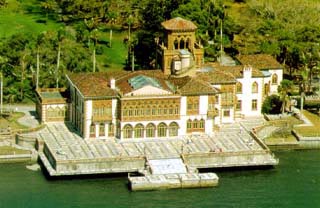
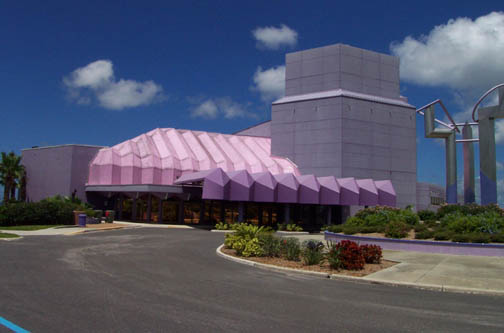
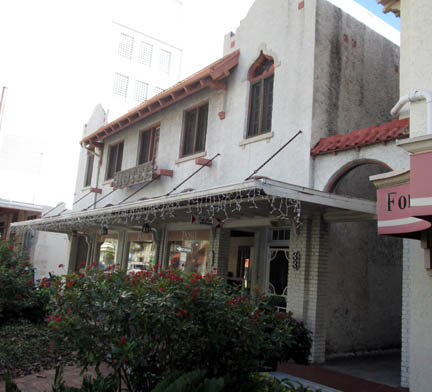
The John Ringling Mansion *** The Van Wezel Auditorium *** Pineapple Street
South
of the Civic Center
in the small complex is the INFORMATION
CENTER , the SARASOTA ART
ASSOCIATION, and the: (3) OLD SARASOTA LIBRARY (1941),
now the SARASOTA COUNTY HISTORICAL
COMMISSION, a one story Doric temple. Mrs. Doris Davis, Sarasota historian, promoted this important protector of Sarasota's heritage. Ironically the area south is filled with
historic controversy as the historic RINGLING HOTEL was torn down. The SARASOTA COUNTY HISTORY CENTER is now at 6062 Porter Way and the main library is at 1001 Blvd. of the Arts. This area contains the luxury RITZ CARLTON (941-309-2000)
and HYATT REGENCY (941-953-1234) hotels and new commercial development.
Driving into this area you might miss at 1133 4th Street
EL VERONA (Belle Haven) (1926), a
three-story Mediterranean masterpiece of Dwight James Baum. The building will hopefully survive as offices for the Quay District projects. The PAGONA BUILDING (1956) houses of Chamber of Commerce which is next to the SARASOTA GARDEN CLUB
DOWNTOWN
SARASOTA
: Turn
left (east) onto First Street
or another street and look for parking.
There is some parking on the waterfront at Marina Plaza
by the popular MARINA JACKS, but you will have to cross busy US41 to walk
downtown.
USE THIS DOWNTOWN MAP AS A GENERAL GUIDELINE
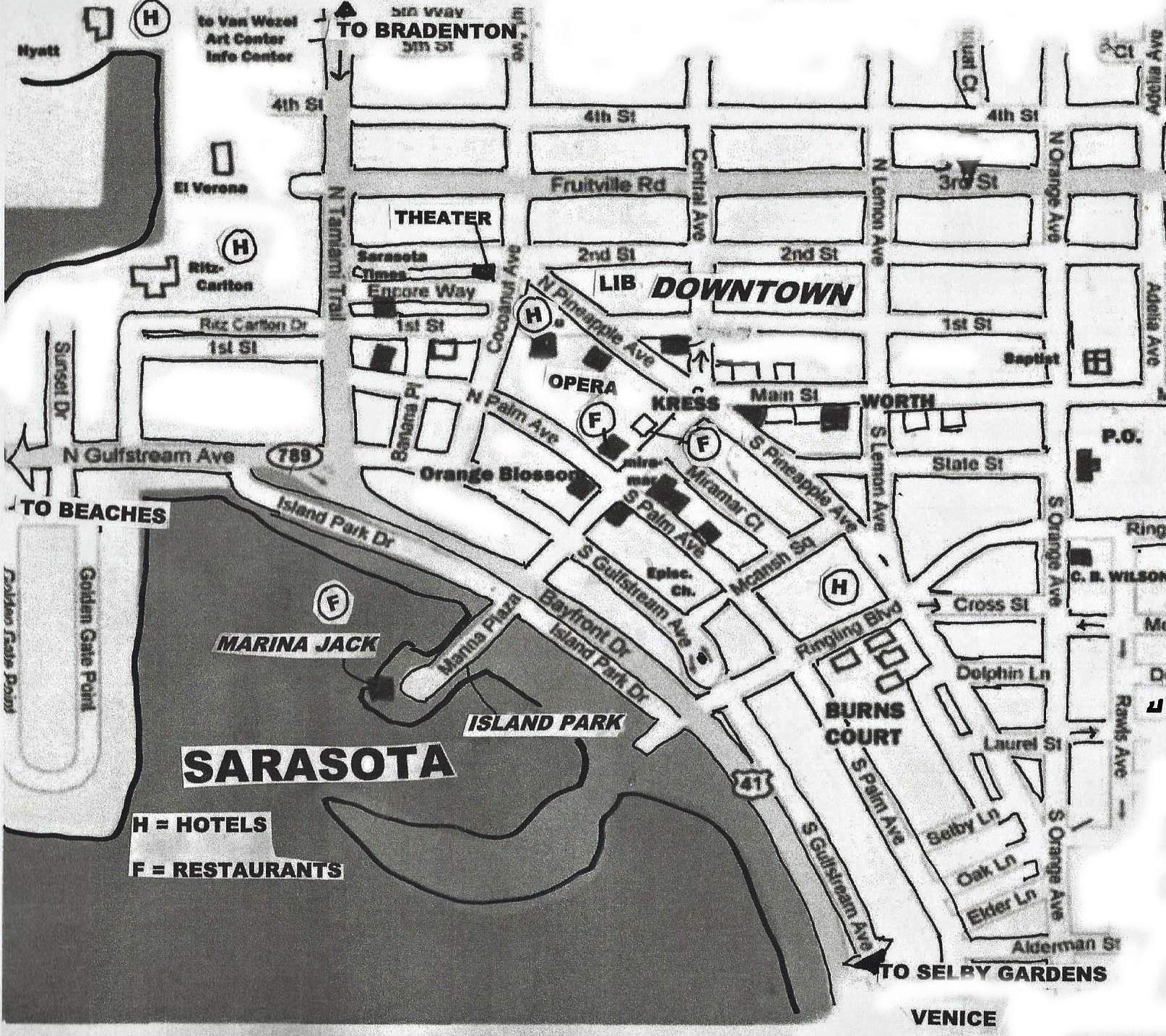
GULF
STREAM AVENUE, the
first street off US41 is lined with
condominium row , but PALM AVENUE has wonderful shops and
restaurants. . On the west side is the EPISCOPAL CHURCH OF THE
REDEEMER financed originally on Pineapple by Dr. Jack Halton and Colonel Gillespie. This edifice dates from the
1940's. On the left at 49 South Palm is the MIRA MAR APARTMENTS/DEMARCAY
HOTEL COMPLEX (1923), started by Scottish-born Andrew McAnsh who designed the Spanish Mission style hotel. Gone is the 1200 seat auditorium. No longer at 201 South Palm is
the BACON & TOULIN BUILDING
(1902).
SARASOTA - THE CITY OF THE ARTS
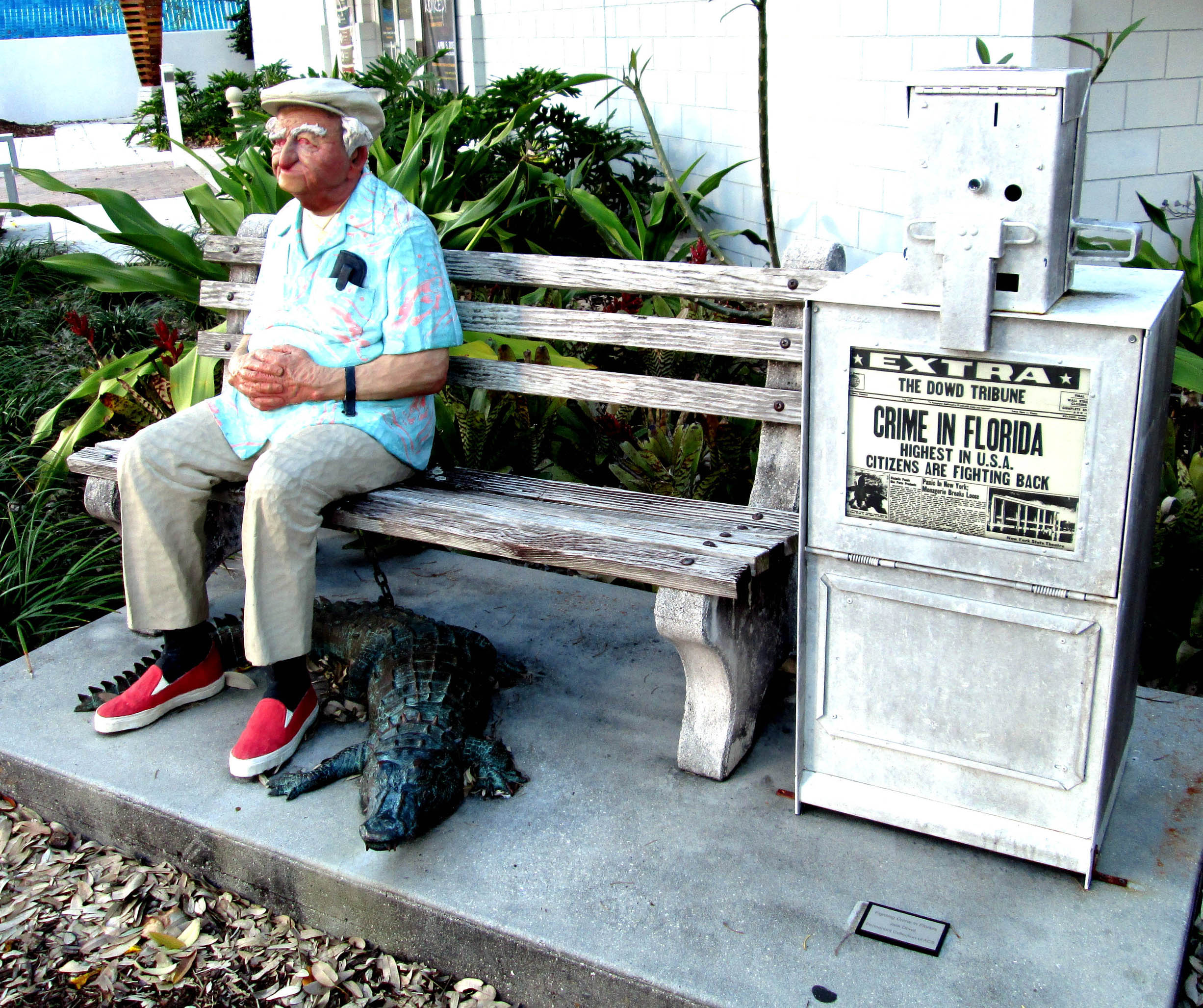
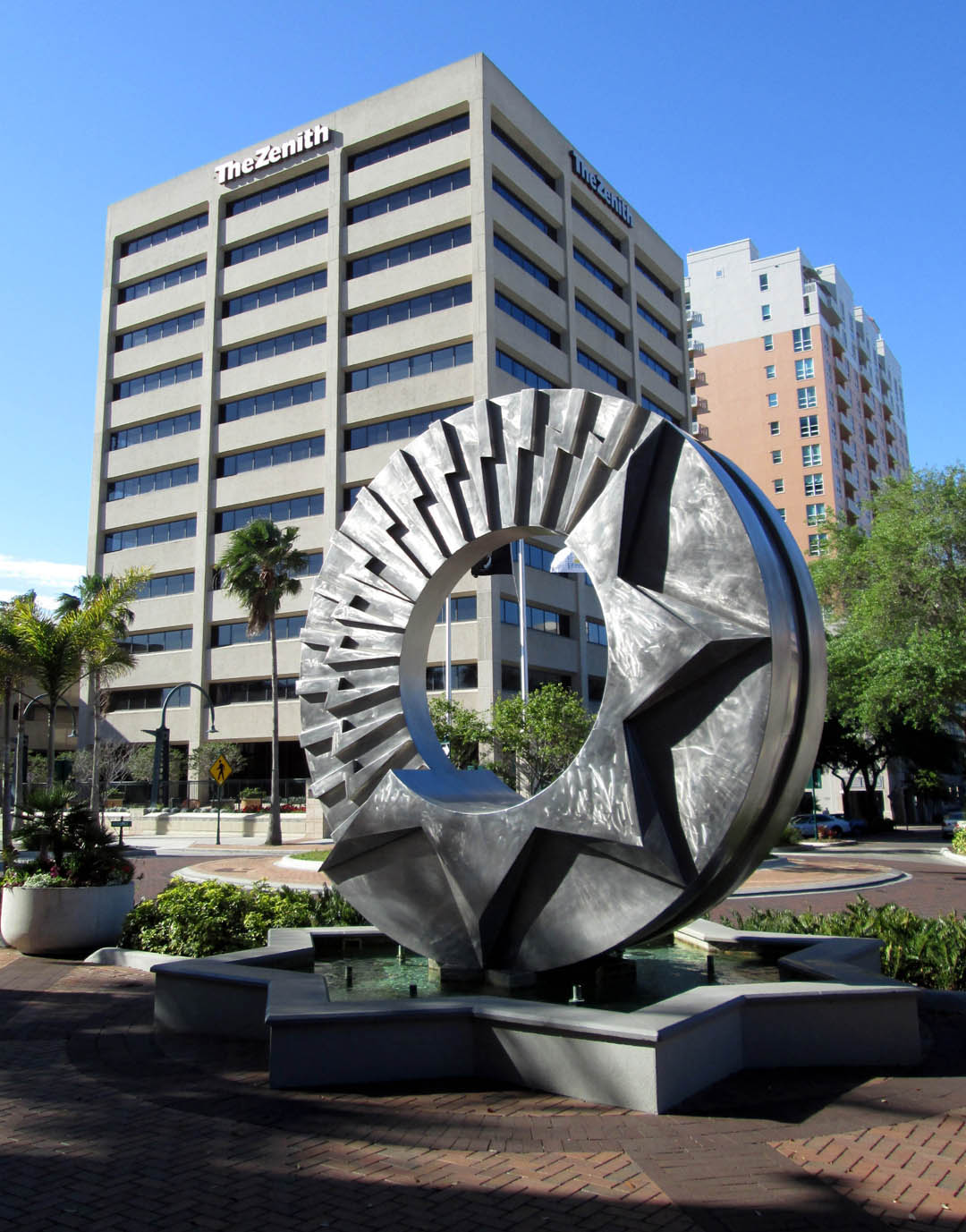
Spoofing Retirement Town Image *** Four Corners Downtown Statue
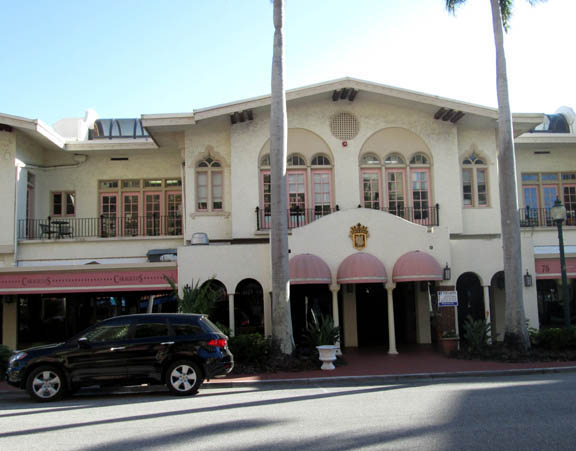
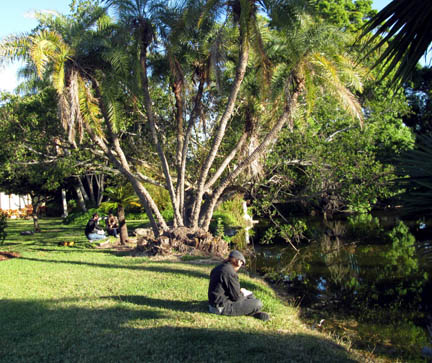
1923 Mira Mar Hotel *** Morning Artists at Botanical Garden
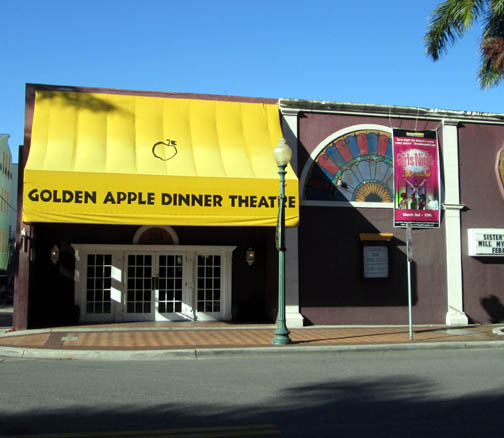
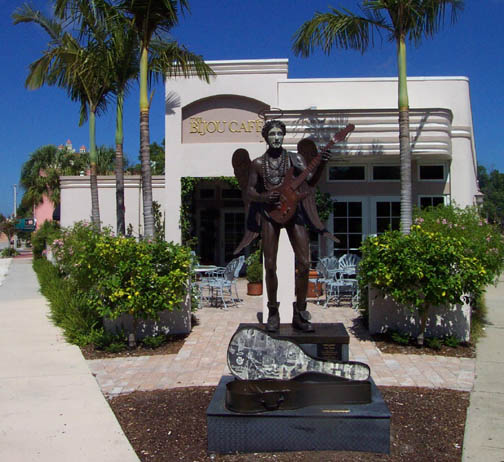
Colorful Golden Apple Theater *** Bijou Cafe 1924 Gas Station
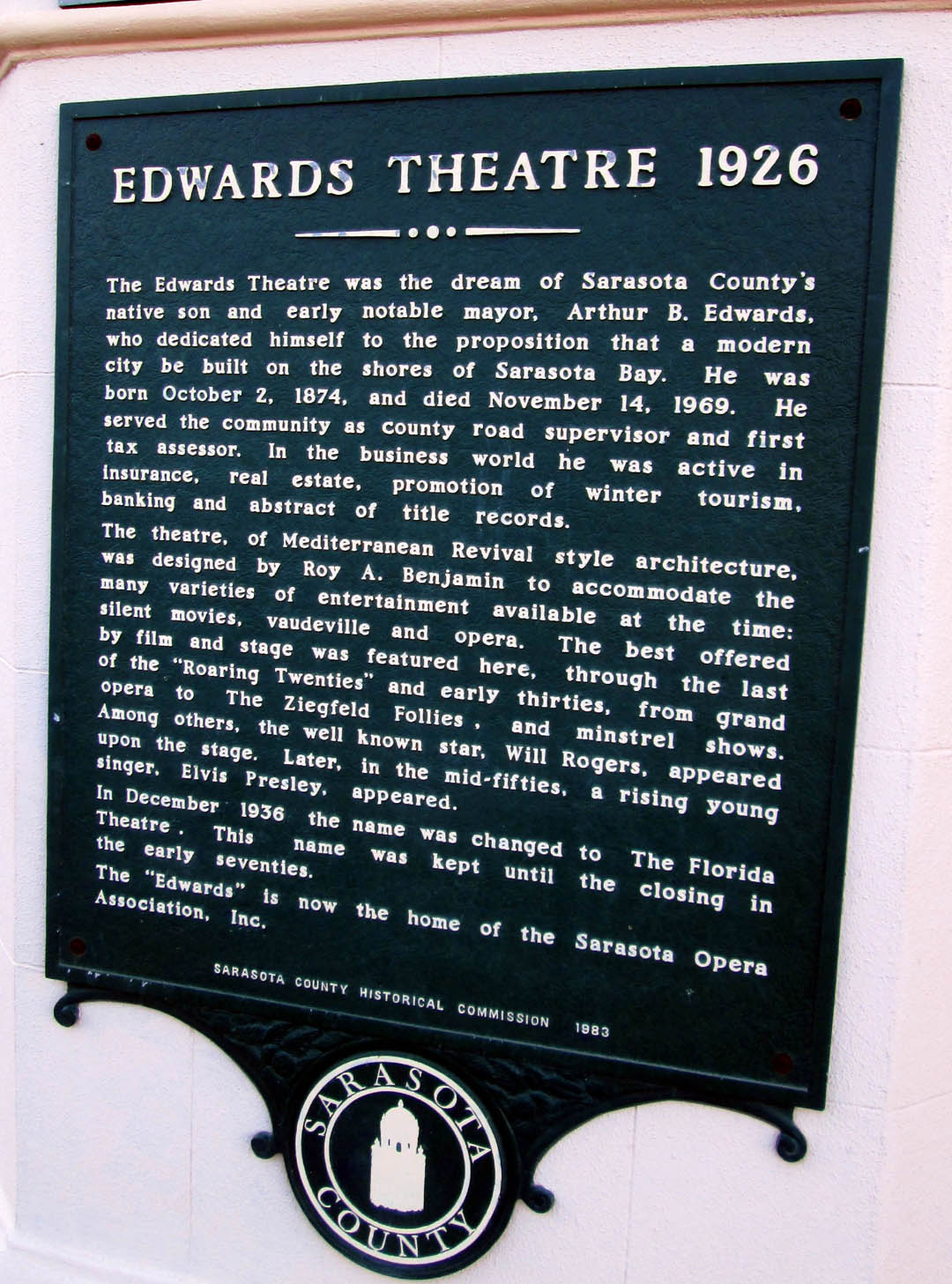
1926 Edwards Theater
Going back to Main Street and heading eastward into
downtown is the next best route. But you might want to walk around the next
block of Palm Avenue to see at 1241 North Palm the beautiful FLORIDA STUDIO THEATER
(1926) At 1330 Main Street is the
towering ORANGE BLOSSOM HOTEL
(1926), once a bank and later a apartment building. The Tower's first floor has a number of shops including a fine arts bazaar. If you continue east on Main Street, you’ll
get to Sarasota’s
downtown core.
Before Main Street, I’d walk down North
Pineapple past the beautiful SELBY
PUBLIC LIBRARY with its neat statues. Across the street is the 1926 SARASOTA OPERA COMPANY Edwards
Theatre), at 57
North Pineapple. The four-plus story
building was designed by Roy A. Benjamin in the Mediterranean Revival style of the
Land Boom. Its interior is as classic as the masonry frontage. Everyone from Elvis to
Sally Rand to Will Rogers have graced the 1,500 seat auditorium.
Across
the way is a converted gas station, now the arty BIJOU CAFÉ, 1287 First Street,
complete with a clever statue. No Florida city has more public art work on
display than Sarasota. The tall structure you see down ar 1216 First is the SARASOTA TIMES
BUILDING (1926),
another Dwight James Baum Mediterranean Revival classic. The dark color and tile looks to me like a Southwest mission. REALTORS ROW (1925) at 1296 First Street has often been called "the Vine Building."
If you decide to backtrack down Palm Avenue, you will notice: the 1926 L. D. REAGIN HOUSE1213 North
Palm, owner of Sarasota Times; the .
The Rowe House


Main
Street in Sarasota
in 1946
Mira Mar Apartments
Go back to Main Street for a heavy dose of stores,
casual restaurants, bookstores, and art galleriesAt 1367 Main Street,
is the three story JOHN IWERSEN BLOCK
(1915), a granite structure that just survived the downtown fire of 1915. It
was the home of the Sarasota Times for years. Sarasota is a great place for dining with outdoor seating at places like CAFE AMICI(1371 Main Street) and the CLASSICO CAFE at 1341 Main Street.
At the “FIVE CORNERS” intersection of Main
and Pineapple is
CROSS PINEAPPLE and "the Five
Corners." On your right at 1442
Main Street is the delightful S.H. KRESS COMPLEX
(1932), Main Street,
an Art Deco three-story buff brick
structure by G. A. Miller. At 1490
Main Street is the WORTH BLOCK
(1925), a commercial complex with offices and homes on the second floor. Downtown Sarasota is still a walkers delight despite overcrowded streets.
Past LEMON STREET on Main Street was the Sarasota Railroad
Depot (1911). On the right in the 1500 block is the FIRST TRUST COMPANY/KICKLITER BROTHERS BUILDING
(1927), a fine Neoclassical Revival brick edifice with a three bay entrance.
Passing the tall Ellis Building (1978) at 1605 Main Street, you'll see on your left
the FIRST BAPTIST
CHURCH
(1924), 1661 Main Street,
a Neo-Classical Revival stone church.
* * *
* *
You will need to walk
back to your automobile to easily reach places around downtown. If you went
north off Main to: 425 North Osprey and
the ART ROWE HOUSE (1934),
a boat-shaped house with a 100- foot octagonal lighthouse off the bow, a
logical residence for the former captain of John Ringling's boat.
RETURN
TO MAIN STREET. At 1819
Main Street is the twelve story
SARASOTA CITY CENTER. TURN
RIGHT ON SOUTH LINKS AVENUE to the funeral home at 22 SOUTH LINKS AVENUE,
a section of which contains the 1885 home of Colonel John Gillespie, founder
and first mayor of Sarasota.
RETURN
TO MAIN STREET and continue
to 2000 Main Street,
the SARASOTA COURTHOUSE (1927), Dwight James Baum's unusual
two-building complex connected by a tower and carillon. The $500,000
"touch of Venice"
nearly bankrupted the city in the Depression.



The Episcopal
Church
Burns Court
TURN
AROUND AND HEAD TOWARD CITY
CENTER (west) ON MAIN STREET, but TURN
LEFT ON ORANGE AVENUE.
At 111 South Orange is the U.S. POST
OFFICE (1932), a Neo- Classical building whose stone facade of bay
entrance ways is matched by Corinthian columns.
On your left at 418-446 South Pineapple is
the unique BURNS COURT (1926), a complex of small buildings now
converted to shops and homes and even a movie-house built by Owen Burns, the Chicago realtor and promoter.
. OTHER BUIDINGS TO LOOK UP : SARASOTA CITY HALL (1913), Orange Avenue and First Street, by John
Nolen; the JOHN H. GILLESPIE HOUSE, on Morrill Street; the JEAN
D. HAZEN HOUSE (1909), 1646 Morrill Street; the WOMENS CLUB,
1241 North Palm (Florida Studio Theater); SARASOTA HIGH SCHOOL
(1913) 1001 South US41, M. Leo Elliott's local masterpiece.
WHERE TO STAY AND DINE: North of downtown on US41 are dozens of motels with a HYATT REGENCY (941-953-1234) at 1000 Blvd. of the Arts. Within walking distance of the theaters and restaurants, are ALOFT SARASOTA (941-870-0900), 1401 Ringling Blvd., the luxurious RITZ-CARLTON TOWER (941-309-2123), at 35 Watergate Drive; and the ART OVATION HOTEL (941-316-0808). Sarasota has a lot of fine dining including Main Street. Out on Island Park is the popular waterfront MARINA JACKS (941-365-4232).
.
















